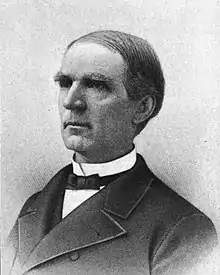William Wirt Henry | |
|---|---|
 | |
| 9th President of the Virginia Bar Association | |
| In office July 16, 1896 – August 5, 1897 | |
| Preceded by | Robert M. Hughes |
| Succeeded by | William B. Pettit |
| Member of the Virginia Senate from the 35th district | |
| In office December 3, 1879 – December 7, 1881 | |
| Succeeded by | William Lovenstein |
| Member of the Virginia House of Delegates from Richmond City | |
| In office December 5, 1877 – December 3, 1879 | |
| Preceded by | W. S. Gilman |
| Succeeded by | S. B. Witt |
| Personal details | |
| Born | William Wirt Henry February 14, 1831 Charlotte, Virginia, U.S. |
| Died | December 5, 1900 (aged 69) Richmond, Virginia, U.S. |
| Political party | Democratic |
| Spouse |
Lucy Gray Marshall (m. 1854) |
| Education | University of Virginia |
| Signature | |
| Military service | |
| Allegiance | |
| Branch/service | Confederate States Army |
| Battles/wars | American Civil War |
William Wirt Henry (February 14, 1831 – December 5, 1900) was a Virginia lawyer and politician, historian and writer, a biographer of Patrick Henry, his grandfather, and who served in both houses of the Virginia General Assembly, and was president of The Virginia Bar Association and the American Historical Association.
Biography
Born at Red Hill in Charlotte County, Virginia, Henry graduated from the University of Virginia, and was admitted to the bar in 1853. He served in the Confederate Army. After the War, he moved his practice to Richmond in 1873, and specialized in appellate advocacy, and was elected two terms in the Virginia House of Delegates and a term in the Senate of Virginia.[1] He was a charter member of the Virginia Society of the Sons of the American Revolution and served as its first president from 1890 to 1897.[2]
Henry served as president of the American Historical Association in 1891,[3] and was president of the Virginia Historical Society for 1891–1892.[4] Henry collected and wrote a three-volume work, Patrick Henry: Life, Correspondence and Speeches,[5] of which the first volume was first published in 1891. Henry also wrote on the trials of Aaron Burr and Jefferson Davis.[6] He also wrote widely cited articles about Captain John Smith[7] and Sir Walter Raleigh. Henry was elected a member of the American Antiquarian Society in 1893.[8]
Henry served as president of The Virginia Bar Association in 1896–1897,[9] and was a vice-president of the American Bar Association, which included his obituary in its annual report for 1900.[10] Henry received honorary law degrees from both the College of William & Mary[11] and Washington & Lee University.[12]
He died at his home in Richmond on December 5, 1900.[10]
References
- ↑ "The Orator of the Day.; Character and Tastes of William Wirt Henry of Virginia" (PDF). The New York Times. September 19, 1893. p. 2. Retrieved April 20, 2022.
- ↑ "Official Handbook of the Virginia Society Sons of the American Revolution" (PDF). Virginia Society Sons of the American Revolution, vol. 1, p. 3. Retrieved December 4, 2016.
- ↑ "Presidential address of William Wirt Henry, 1891". The American Historical Association. Retrieved March 7, 2008.
- ↑ "Annual Report, 2006" (PDF). Virginia Historical Society. Retrieved March 7, 2008.
- ↑ Henry, William Wirt (2006). Patrick Henry: Life, Correspondence and Speeches, vol. 1. ISBN 978-1-4286-3115-1.
- ↑ Henry, William Wirt; et al. (2006). The Trial of Aaron Burr and the Trials of Jefferson Davis. ISBN 978-1-4286-5761-8.
- ↑ "Was John Smith a Liar?". American Heritage, October 1958 (citing Wirt). Retrieved March 7, 2008.
- ↑ American Antiquarian Society Members Directory
- ↑ "VBA History and Heritage". The Virginia Bar Association. Archived from the original on September 27, 2007. Retrieved March 7, 2008.
- 1 2 Report of the Twenty-Third Annual Meeting of the American Bar Association. Philadelphia: Dando Printing and Publishing Company. 1900. pp. 632–634. Retrieved April 20, 2022 – via Google Books.
- ↑ "Honorary degree recipients" (PDF). Swem Library, College of William & Mary. Retrieved March 7, 2008.
- ↑ "Honorary degrees conferred". Washington & Lee University. Retrieved March 7, 2008.
External links
 Works by or about William Wirt Henry at Wikisource
Works by or about William Wirt Henry at Wikisource